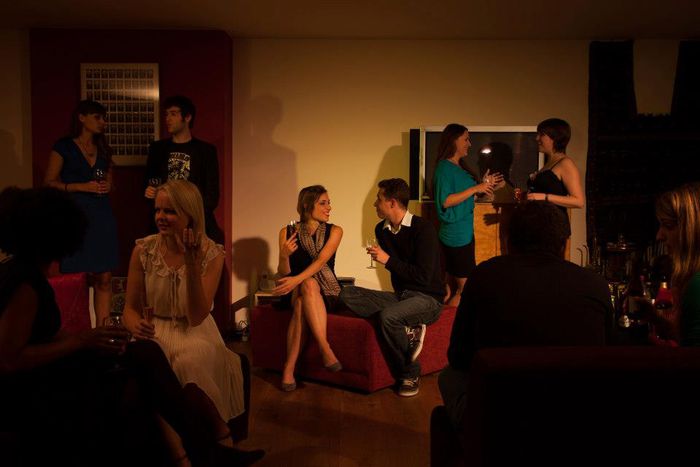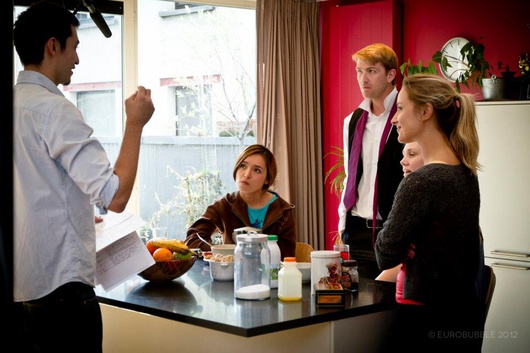
'Eurobubble' web series - the other side of Brussels
Published on
Translation by:
Gilhean Slater'This is not Brussels, welcome to the Eurobubble' runs the closing phrase of the trailer for the satirical online series entitled Eurobubble, created by Yacine Kehouen. The characters are young people from all over Europe who work in the world of associations and institutions which have their headquarters in the Belgian and EU capital
The Belgian capital is a target destination for any student specialised in economic, political or social science. They will have all considered moving to Brussels at least once during their university studies. Brussels is a niche in the EU job market. Behind the big names of hundreds of associations and research centres lies an entire generation of young Europeans working as interns, lobbyists, policy officers and project managers. To sum it up in one word: 'Eurobubble'. Since 2011 Yacine Kouhen has been describing his life in the bubble on his eponymous blog. Having worked as a policy officer and project manager, he describes himself as an 'ex-Eurobubbler'. After three years in the city he is currently launching a communications agency with friends. Thanks to crowdfunding, his Eurobubble blog has also become a popular youtube series. Its biggest fans are the newly qualified and newly hired inhabitants of the 'Eurobubble', the exact people the author pokes fun at in his blog.
hunting for work in the bubble
Yacine lives near Brussels' Palace of Justice. As soon as the door opens I know I have the right address: the man standing in front of me is the main character in the online series. 'The Eurobubble is a city within a city,' says Yacine, as we have coffee in the garden . It's a sort of bell jar contained between a couple of metro stops, which is isolated from Belgian citizens. 'The young people who work here are all university educated, highly qualified, speak on average three languages, have done an erasmus student exchange programme and have lived in at least two different countries other than their country of origin,' says Yacine, describing the sociological profile of this reality. 'People come to Brussels to try and find work, but it is very difficult to find a job, even for those who are extremely qualified.'
 These young people 'don’t earn salaries in line with their skills and qualifications,' as Yacine puts it. In fact, earning little more than 1, 000 euros a month, life in Brussels is far from luxurious. Furthermore, candidates who come here looking for work have to accept the inevitable difficulties which accompany such a niche job market. 'It’s practically impossible to find a job unless you do an internship first,' says Yacine. 'Once you have your foot in the door of one of the thousands of organisations here it’s all about networking and your ability to make friends with people who work in the European institutions or in other organisations.' He can’t help smirking as he describes the perfect place to carry out such an activity. Place du Luxembourg is a lively square just in front of the European parliament. After a hard day of work the young professionals of Brussels spill out onto the streets of 'Plux', filling the numerous trendy bars clustered around the square for an after work drink with friends.
These young people 'don’t earn salaries in line with their skills and qualifications,' as Yacine puts it. In fact, earning little more than 1, 000 euros a month, life in Brussels is far from luxurious. Furthermore, candidates who come here looking for work have to accept the inevitable difficulties which accompany such a niche job market. 'It’s practically impossible to find a job unless you do an internship first,' says Yacine. 'Once you have your foot in the door of one of the thousands of organisations here it’s all about networking and your ability to make friends with people who work in the European institutions or in other organisations.' He can’t help smirking as he describes the perfect place to carry out such an activity. Place du Luxembourg is a lively square just in front of the European parliament. After a hard day of work the young professionals of Brussels spill out onto the streets of 'Plux', filling the numerous trendy bars clustered around the square for an after work drink with friends.
isolated city
 Eurobubblers only socialise amongst themselves and their isolation is becoming worse. 'It’s a feeling you get whilst going about the city. I don’t think Eurobubblers integrate much. I don’t think they have a brilliant reputation with the locals,' says Yacine. He cites how the influx of highly qualified workers has pushed rents costs up in the city for this lack of integration. The fact that the work market is almost impenetrable does not incite any sympathy or understanding. 'It is always the case that when we don’t know something, we remain sceptical,' he says.
Eurobubblers only socialise amongst themselves and their isolation is becoming worse. 'It’s a feeling you get whilst going about the city. I don’t think Eurobubblers integrate much. I don’t think they have a brilliant reputation with the locals,' says Yacine. He cites how the influx of highly qualified workers has pushed rents costs up in the city for this lack of integration. The fact that the work market is almost impenetrable does not incite any sympathy or understanding. 'It is always the case that when we don’t know something, we remain sceptical,' he says.
I detect a hint of bitterness in his voice. It turns out that Brussels is not the only ‘bubble’, as he loves to describe it, that he has encountered during his career so far. The same phenomenon will happen in any city where there are so many people with similar qualifications. 'However in Brussels the effect is more shocking: we are speaking about thousands of people.' The Eurobubble is not a negative thing in itself however; the European institutions need to have their headquarters somewhere. 'Plus, the Eurobubble is a fascinating place due to all the important decisions being made here.' Perhaps this is why Yacine has decided to open a communications agency here with his friends. Their plan is also to 'introduce the world of the Eurobubble to those who do not know it'. In the meantime everyone can watch the youtube series, Yacime affirms, his smile sincere as he bids me farewell.
Translated from Eurobubble: l'altro volto di bruxelles



